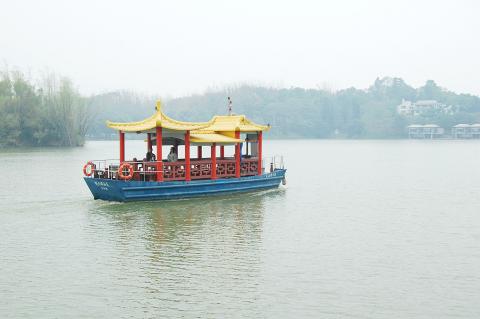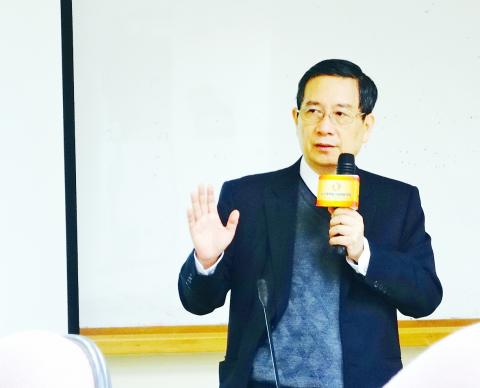The ongoing water shortage poses a serious downside risk to the economy, which has achieved stability as cheaper fuel expenses boost corporate profits and consumer spending, Yuanta-Polaris Research Institute (元大寶華研究院) said yesterday.
Water rationing could affect the output of major industries by up to 20 percent, removing as much as 0.825 percentage point from GDP growth this year — if the water shortage persists, institute chairman Liang Kuo-yuan (梁國源) said on the sidelines of a quarterly news conference.
However, the chances of that outcome coming to pass are diminishing amid this week’s precipitation and the upcoming monsoon season, the economist said.

Photo: Yang Chin-cheng, Taipei Times
Manufacturers across sectors including metals, petrochemicals, textiles and paper products, as well as critical electronic components, are more vulnerable to water rationing, he said, adding that they account for 16.7 percent of GDP.
However, a more likely scenario this year is a 5 percent decline in total output due to the water shortage, with GDP growth softened by 0.2 percentage points, Liang said.
“That means the nation’s economy may manage to stay above 3.5 percent this year,” he said.

Photo: Wang Meng-lun, Taipei Times
The Taipei-based think tank yesterday raised its forecast for GDP growth to 3.66 percent for this year, from 3.45 percent it projected three months earlier, citing stronger private consumption and net exports attributable mainly to cheaper fuel and electricity costs.
Global trade improved in the second half of last year and the trend is expected to continue this year, although the volume has yet to recover to the levels seen before the global financial crisis in 2008, the institute said.
Exports contracted 1.3 percent for the first two months of this year, but cheaper crude prices helped lower imports by a faster pace and therefore widened trade surpluses, government data showed.
Energy cost savings allow companies to post stronger earnings and individuals to buy more non-fuel items, the institutes said.
International researchers report that demand for Apple Inc’s iPhone and other electronic devices remain strong and local companies in the supply chain may continue to thrive, Liang said.
Companies involved in non-tech sector exports could extend a lackluster performance from last year as crude prices might not stage a comeback soon, he said.
Given that, Yuanta-Polaris cut its forecast for consumer price growth to a record low of 0.1 percent this year.
Liang dismissed deflation concerns, saying that prices for food and non-fuel consumption continue to climb.
The pace of interest rate hikes by the US is likely to pose another headwind for the local economy, as global fund movements could hit the local bourse more intensely, the economist said.
The central bank may step in to stabilize the local currency, which may trade at an average of NT$31.9 against its US counterpart this year, the institute said.

In Italy’s storied gold-making hubs, jewelers are reworking their designs to trim gold content as they race to blunt the effect of record prices and appeal to shoppers watching their budgets. Gold prices hit a record high on Thursday, surging near US$5,600 an ounce, more than double a year ago as geopolitical concerns and jitters over trade pushed investors toward the safe-haven asset. The rally is putting undue pressure on small artisans as they face mounting demands from customers, including international brands, to produce cheaper items, from signature pieces to wedding rings, according to interviews with four independent jewelers in Italy’s main

Japanese Prime Minister Sanae Takaichi has talked up the benefits of a weaker yen in a campaign speech, adopting a tone at odds with her finance ministry, which has refused to rule out any options to counter excessive foreign exchange volatility. Takaichi later softened her stance, saying she did not have a preference for the yen’s direction. “People say the weak yen is bad right now, but for export industries, it’s a major opportunity,” Takaichi said on Saturday at a rally for Liberal Democratic Party candidate Daishiro Yamagiwa in Kanagawa Prefecture ahead of a snap election on Sunday. “Whether it’s selling food or

CONCERNS: Tech companies investing in AI businesses that purchase their products have raised questions among investors that they are artificially propping up demand Nvidia Corp chief executive officer Jensen Huang (黃仁勳) on Saturday said that the company would be participating in OpenAI’s latest funding round, describing it as potentially “the largest investment we’ve ever made.” “We will invest a great deal of money,” Huang told reporters while visiting Taipei. “I believe in OpenAI. The work that they do is incredible. They’re one of the most consequential companies of our time.” Huang did not say exactly how much Nvidia might contribute, but described the investment as “huge.” “Let Sam announce how much he’s going to raise — it’s for him to decide,” Huang said, referring to OpenAI

The global server market is expected to grow 12.8 percent annually this year, with artificial intelligence (AI) servers projected to account for 16.5 percent, driven by continued investment in AI infrastructure by major cloud service providers (CSPs), market researcher TrendForce Corp (集邦科技) said yesterday. Global AI server shipments this year are expected to increase 28 percent year-on-year to more than 2.7 million units, driven by sustained demand from CSPs and government sovereign cloud projects, TrendForce analyst Frank Kung (龔明德) told the Taipei Times. Demand for GPU-based AI servers, including Nvidia Corp’s GB and Vera Rubin rack systems, is expected to remain high,